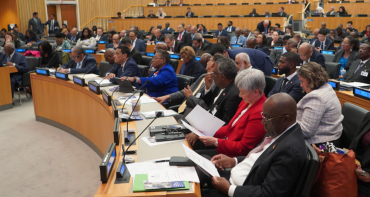The Commonwealth Secretariat has launched a publication, A Commonwealth Guide to Case Management, that seeks to help courts manage civil cases more efficiently. The guide, produced by the Secretariat’s Office of Civil and Criminal Justice Reform (OCCJR), is designed for practitioners, judicial officers and policymakers. It provides best practice and practical advice to improve court administration and proceedings.

The guide, A Commonwealth Guide to Case Management, aims to inform forward-looking best practices through a comparative analysis of member countries, and to align efficiency with the constitutional values underlying the administration of justice.
It was developed in close consultation with the Commonwealth Working Group on Civil Procedure Law Reform, comprising experts and officials with a passion for improving justice outcomes in member countries.
Assistant Secretary-General at the Commonwealth Secretariat, Prof Luis Franceschi, thanked the members of the working group for generously providing their time and considerable expertise.
Prof Franceschi said:
"Efficient court management systems are the backbone of a fair and just society. They ensure that justice is delivered promptly, reducing delays and costs, and upholding the rule of law. By streamlining processes and promoting transparency, effective court management systems can help rebuild trust in the justice system and promote a more equitable Commonwealth we can all be proud of.”
“Without a doubt, well-designed case management systems, alongside transformative technology, not only facilitate and support effective court proceedings, but also allow for innovation and justice modernisation.”
The Assistant Secretary-General also encouraged member countries to embrace this valuable tool and collectively pave the way towards a future marked by an efficient and effective justice system.
The Office of Civil and Criminal Justice Reform (OCCJR) was set up by the Commonwealth Secretary-General, the Rt Hon Patricia Scotland KC, to transform the operation of justice systems and delivery of justice across the 56 member states. She also spoke to the guide’s utility, noting that the best practices have tapped into the diversity and wealth of knowledge within the Commonwealth.
In the foreword to the guide, the Commonwealth Secretary-General said:
“This is not a one-size-fits-all approach to addressing challenges in civil procedure, due to the diversity of civil procedure laws across the Commonwealth, as well as differences in resourcing capacity, technological capacity, and infrastructure.”
The OCCJR carries out this mission by working with experts to create useful, impactful, agile and user-centred legal knowledge products, networks, and platforms designed to increase access to justice for all.
Mukhtar Adesunkanmi, coordinator of the project for the OCCJR, commented:
"The Covid-19 pandemic laid bare the challenges of case management and its effect on the delivery of justice across the world. It is my expectation that this guide will instigate reforms through innovative solutions in judicial administration, engendering effective access to justice as well as sustainable peace and development.”
The Commonwealth Secretariat continues to play a key role in civil and criminal justice reform. With this project, the OCCJR continues to promote equitable, accessible, and effective justice for all - particularly following the shocks of the recent pandemic.
Media contact
-
Snober Abbasi, Senior Communications Officer, Communications Division, Commonwealth Secretariat



